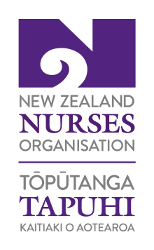 New Zealand Nurses Organisation media release, 17 April 2020
New Zealand Nurses Organisation media release, 17 April 2020
The New Zealand Nurses Organisation (NZNO) is disappointed that nursing and other health care staff are being blamed for bringing COVID-19 into the workplace without any real evidence or proper investigation – or that the problem is that staff aren’t using personal protective equipment (PPE) properly.
Specifically this has been raised in relation to Waikato Hospital and aged care sites in Canterbury, but health care workers across the country feel blamed rather than supported.
NZNO Kaiwhakahaere Kerri Nuku said it is also disappointing that this misinformation is happening on a daily basis.
“The assertion that more than half of the COVID-19-positive health care staff in Aotearoa New Zealand contracted the virus outside work is not at all believable, and our members are surprised such things are being said.
“It’s a suggestion that comes at a convenient time for employers in DHBs and Aged Care, who were being so roundly criticised over inadequate PPE availability.”
Ms Nuku said the second implication is that nurses and care givers are being careless or are unskilled, when nothing could be further from the truth.
“Nurses and care givers are dedicated and compassionate, and courageously turn up to work where many of us wouldn’t – so to diminish that by blaming them in the middle of a very distressing situation is a very big and uncharitable call.”
Research out of Wuhan, published in the last week, indicates that floors, surfaces and the air in health facilities can now be commonly contaminated with COVID-191 and Ms Nuku says infection is much more likely to have come from contact with patients or from within the workplace environment itself.
“This underscores the need for the full PPE nurses have been demanding (including hair nets and shoe covers) – and which some staff, who have become infected, were explicitly told not to wear.”
NZNO members at affected work sites won’t speak up publicly because they may be disciplined for talking about their working conditions, but they say the reality of working on the COVID-19 frontline is often very different to what the public is told.
“Nurses and care givers are telling us they fear for their families, whānau and communities and that they cannot sleep at night for worry,” Ms Nuku said.
“Many have told us there is clearly not enough PPE in wards and that it is often locked away so staff can’t get to it. Others say they are told to attend to patients who are showing symptoms without PPE because the patients are deemed ‘low risk’. One member wonders why PPE seems to be valued more highly than the health and wellbeing of nursing staff.
“So it’s unfair to blame nursing staff. We are all in this together and must be kind, so we need to protect the mana of our nurses and carers. This is no time to speculate and apportion blame.”
-Ends-
Media inquiries: Rob Zorn, NZNO Media and Communications Advisor: 027 431 2617
_________________
1. Guo Z-D, Wang Z-Y, Zhang S-F, Li X, Li L, Li C, et al. (2020). Aerosol and surface distribution of severe acute respiratory syndrome coronavirus 2 in hospital wards, Wuhan, China, 2020. Emerging Infectious Diseases. 2020 July. https://doi.org/10.3201/eid2607.200885